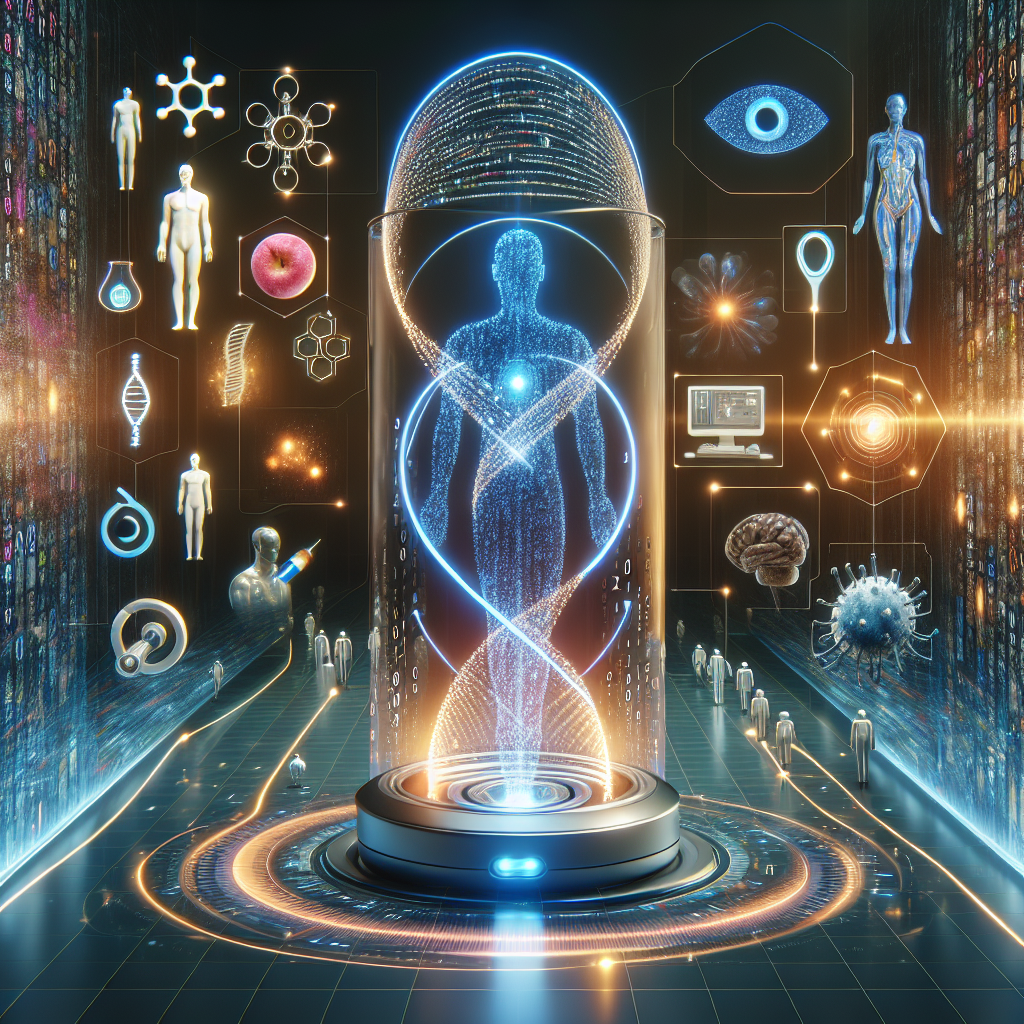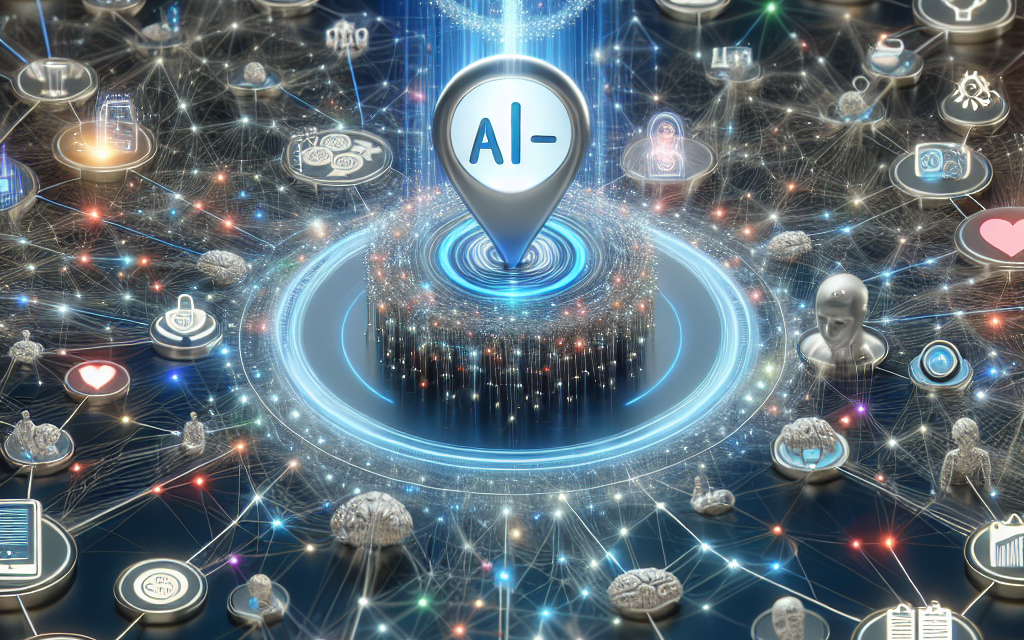Understanding the Impact of AI-Driven Precision Healthcare

In recent years, the healthcare industry has witnessed a transformative shift with the integration of artificial intelligence (AI) into precision medicine. This evolution is not just a technological advancement but a paradigm shift that promises to revolutionize patient care, diagnosis, and treatment. AI-driven precision healthcare leverages vast amounts of data to tailor medical treatments to individual patients, enhancing outcomes and efficiency. This article delves into the multifaceted impact of AI in precision healthcare, exploring its potential, challenges, and future prospects.
The Role of AI in Personalized Medicine
Personalized medicine, also known as precision medicine, is an innovative approach that considers individual variability in genes, environment, and lifestyle for each person. AI plays a crucial role in this domain by analyzing complex datasets to identify patterns and make predictions that were previously unattainable.
Genomic Sequencing and AI
Genomic sequencing has become a cornerstone of personalized medicine, providing insights into the genetic makeup of individuals. AI algorithms are instrumental in interpreting the vast amounts of data generated by genomic sequencing. These algorithms can identify genetic mutations and predict their impact on health, enabling more accurate diagnoses and targeted treatments.
For instance, AI-driven tools have been used to identify specific genetic markers associated with diseases such as cancer, allowing for early detection and personalized treatment plans. A study published in Nature Medicine demonstrated that AI could predict the likelihood of cancer recurrence by analyzing genomic data, significantly improving patient outcomes.
AI in Drug Discovery
The drug discovery process is notoriously time-consuming and expensive. AI has the potential to streamline this process by identifying promising drug candidates more efficiently. Machine learning algorithms can analyze biological data to predict how different compounds will interact with specific targets, reducing the need for extensive laboratory testing.
Pharmaceutical companies are increasingly adopting AI-driven platforms to accelerate drug discovery. For example, Insilico Medicine, a biotechnology company, uses AI to identify new drug targets and design novel molecules. Their AI platform has successfully identified potential treatments for diseases such as fibrosis and cancer, demonstrating the transformative potential of AI in drug discovery.
AI in Clinical Decision Support
AI-powered clinical decision support systems (CDSS) are designed to assist healthcare professionals in making informed decisions. These systems analyze patient data, including medical history, lab results, and imaging studies, to provide evidence-based recommendations for diagnosis and treatment.
One notable example is IBM Watson Health, which uses AI to analyze vast amounts of medical literature and patient data to provide personalized treatment recommendations. In oncology, Watson for Oncology has been used to assist oncologists in developing treatment plans for cancer patients, improving the accuracy and efficiency of clinical decision-making.
AI in Predictive Analytics
Predictive analytics is a powerful tool in precision healthcare, enabling the identification of patients at risk of developing certain conditions. AI algorithms can analyze electronic health records (EHRs) and other data sources to predict disease onset and progression, allowing for early intervention and prevention strategies.
For example, researchers at the University of California, San Francisco, developed an AI model that predicts the likelihood of sepsis in hospitalized patients. By analyzing EHR data, the model can identify patients at risk of sepsis up to 48 hours before symptoms appear, enabling timely intervention and reducing mortality rates.
AI in Patient Monitoring and Management
AI-driven technologies are revolutionizing patient monitoring and management, particularly for chronic diseases. Wearable devices equipped with AI algorithms can continuously monitor vital signs and other health metrics, providing real-time feedback to patients and healthcare providers.
For instance, AI-powered wearables can detect irregular heart rhythms, such as atrial fibrillation, and alert patients and physicians to potential health issues. This continuous monitoring allows for early detection and intervention, improving patient outcomes and reducing healthcare costs.
Challenges and Ethical Considerations
While AI-driven precision healthcare holds immense promise, it also presents several challenges and ethical considerations that must be addressed to ensure its successful implementation.
Data Privacy and Security
The use of AI in healthcare relies heavily on the collection and analysis of vast amounts of personal health data. This raises significant concerns about data privacy and security. Ensuring the confidentiality and integrity of patient data is paramount to maintaining trust in AI-driven healthcare solutions.
Healthcare organizations must implement robust data protection measures, including encryption and access controls, to safeguard patient information. Additionally, compliance with regulations such as the General Data Protection Regulation (GDPR) and the Health Insurance Portability and Accountability Act (HIPAA) is essential to protect patient privacy.
Bias and Fairness in AI Algorithms
AI algorithms are only as good as the data they are trained on. If the training data is biased or unrepresentative, the resulting algorithms may perpetuate or even exacerbate existing disparities in healthcare. Ensuring fairness and equity in AI-driven healthcare requires careful consideration of the data used to train algorithms.
Researchers and developers must actively work to identify and mitigate biases in AI models. This includes using diverse and representative datasets, as well as implementing techniques to detect and correct bias in algorithmic decision-making.
Regulatory and Legal Challenges
The rapid advancement of AI in healthcare has outpaced the development of regulatory frameworks to govern its use. This presents significant challenges for ensuring the safety and efficacy of AI-driven healthcare solutions.
Regulatory bodies, such as the U.S. Food and Drug Administration (FDA), are working to develop guidelines for the approval and oversight of AI-based medical devices and software. However, the dynamic nature of AI technology requires flexible and adaptive regulatory approaches to keep pace with innovation.
Ethical Implications of AI in Healthcare
The use of AI in healthcare raises important ethical questions, particularly regarding the autonomy and agency of patients. As AI systems become more involved in clinical decision-making, it is essential to ensure that patients retain control over their healthcare choices.
Healthcare providers must prioritize informed consent and transparency when using AI-driven tools. Patients should be fully informed about the role of AI in their care and have the opportunity to discuss any concerns or preferences with their healthcare providers.
Integration and Interoperability
Integrating AI-driven solutions into existing healthcare systems can be challenging, particularly in terms of interoperability. Ensuring that AI tools can seamlessly communicate with electronic health records and other healthcare technologies is essential for their successful implementation.
Healthcare organizations must invest in infrastructure and standards that support interoperability, enabling the seamless exchange of data between AI systems and other healthcare technologies. This will facilitate the integration of AI-driven solutions into clinical workflows and improve patient care.
Case Studies: Successful Implementation of AI in Precision Healthcare
Several case studies highlight the successful implementation of AI-driven precision healthcare solutions, demonstrating their potential to improve patient outcomes and transform the healthcare landscape.
AI in Oncology: Memorial Sloan Kettering Cancer Center
Memorial Sloan Kettering Cancer Center (MSKCC) has been at the forefront of integrating AI into oncology care. The center has partnered with IBM Watson Health to develop Watson for Oncology, an AI-powered clinical decision support system that assists oncologists in developing personalized treatment plans for cancer patients.
Watson for Oncology analyzes vast amounts of medical literature and patient data to provide evidence-based treatment recommendations. The system has been shown to improve the accuracy and efficiency of clinical decision-making, leading to better patient outcomes.
A study conducted at MSKCC found that Watson for Oncology’s treatment recommendations were concordant with those of oncologists in 93% of cases, demonstrating the system’s potential to enhance cancer care.
AI in Radiology: Stanford University
Researchers at Stanford University have developed an AI algorithm capable of diagnosing pneumonia from chest X-rays with accuracy comparable to that of radiologists. The algorithm, known as CheXNet, was trained on a dataset of over 100,000 chest X-ray images and can identify pneumonia with high sensitivity and specificity.
CheXNet has the potential to improve the efficiency and accuracy of radiology workflows, particularly in resource-limited settings where access to radiologists may be limited. By automating the interpretation of chest X-rays, the algorithm can help reduce diagnostic errors and improve patient outcomes.
AI in Cardiology: Mayo Clinic
The Mayo Clinic has implemented an AI-driven tool to predict the risk of atrial fibrillation (AF) in patients. The tool analyzes electrocardiogram (ECG) data to identify subtle patterns indicative of AF, even in patients without symptoms.
A study published in The Lancet demonstrated that the AI tool could accurately predict AF with a sensitivity of 79% and a specificity of 81%. This early detection allows for timely intervention and management, reducing the risk of complications such as stroke.
AI in Diabetes Management: Medtronic
Medtronic, a leading medical device company, has developed an AI-powered insulin pump system known as the MiniMed 670G. The system uses machine learning algorithms to continuously monitor glucose levels and automatically adjust insulin delivery, providing personalized diabetes management.
The MiniMed 670G has been shown to improve glycemic control and reduce the risk of hypoglycemia in patients with type 1 diabetes. A clinical trial published in JAMA demonstrated that patients using the system experienced a significant reduction in HbA1c levels and spent more time in the target glucose range.
AI in Mental Health: Woebot
Woebot is an AI-powered chatbot designed to provide mental health support and therapy. The chatbot uses natural language processing and machine learning algorithms to engage users in conversations and provide evidence-based cognitive behavioral therapy (CBT) techniques.
A study published in the Journal of Medical Internet Research found that users of Woebot experienced significant reductions in symptoms of anxiety and depression after just two weeks of use. The chatbot offers a scalable and accessible solution for mental health support, particularly for individuals who may face barriers to accessing traditional therapy.
The Future of AI-Driven Precision Healthcare
The future of AI-driven precision healthcare is promising, with ongoing advancements in technology and research poised to further transform the industry. Several key trends and developments are expected to shape the future of AI in healthcare.
Advancements in AI Algorithms
As AI algorithms continue to evolve, they are expected to become more accurate and efficient in analyzing complex healthcare data. Advances in deep learning and neural networks will enable AI systems to process and interpret data with greater precision, leading to improved diagnostic and treatment capabilities.
Researchers are also exploring the use of explainable AI, which aims to make AI decision-making processes more transparent and understandable. This will enhance trust in AI-driven healthcare solutions and facilitate their integration into clinical practice.
Integration with Emerging Technologies
The integration of AI with other emerging technologies, such as the Internet of Things (IoT) and blockchain, is expected to enhance the capabilities of precision healthcare solutions. IoT devices, such as wearable sensors, can provide real-time health data that AI algorithms can analyze to deliver personalized insights and recommendations.
Blockchain technology can enhance data security and interoperability, enabling the secure exchange of health information between AI systems and other healthcare technologies. This will facilitate the seamless integration of AI-driven solutions into healthcare workflows.
Expansion of AI Applications
The applications of AI in healthcare are expected to expand beyond traditional domains, such as diagnostics and treatment, to encompass areas such as preventive care and population health management. AI-driven tools can analyze population-level data to identify trends and patterns, enabling the development of targeted interventions and public health strategies.
AI is also expected to play a role in addressing social determinants of health, such as access to care and socioeconomic factors, by providing insights into the underlying causes of health disparities and informing policy decisions.
Collaboration and Partnerships
Collaboration between healthcare organizations, technology companies, and research institutions will be essential to advancing AI-driven precision healthcare. Partnerships can facilitate the sharing of data and expertise, accelerating the development and implementation of innovative solutions.
Public-private partnerships, in particular, can drive research and development efforts, ensuring that AI-driven healthcare solutions are accessible and affordable for all patients.
Regulatory and Policy Developments
As AI continues to transform healthcare, regulatory and policy frameworks will need to evolve to ensure the safe and ethical use of AI-driven solutions. Policymakers must work to develop guidelines that balance innovation with patient safety and privacy.
International collaboration on regulatory standards will be essential to facilitate the global adoption of AI-driven healthcare solutions and ensure consistency in their implementation across different regions.
Conclusion
AI-driven precision healthcare represents a significant advancement in the field of medicine, offering the potential to revolutionize patient care and improve outcomes. By harnessing the power of AI, healthcare providers can deliver personalized treatments, enhance diagnostic accuracy, and streamline clinical workflows.
However, the successful implementation of AI-driven precision healthcare requires careful consideration of ethical, regulatory, and technical challenges. By addressing these challenges and fostering collaboration between stakeholders, the healthcare industry can unlock the full potential of AI to transform patient care and improve health outcomes for individuals worldwide.
As we look to the future, continued advancements in AI technology and research will drive the evolution of precision healthcare, paving the way for a new era of personalized medicine that is more effective, efficient, and equitable.





